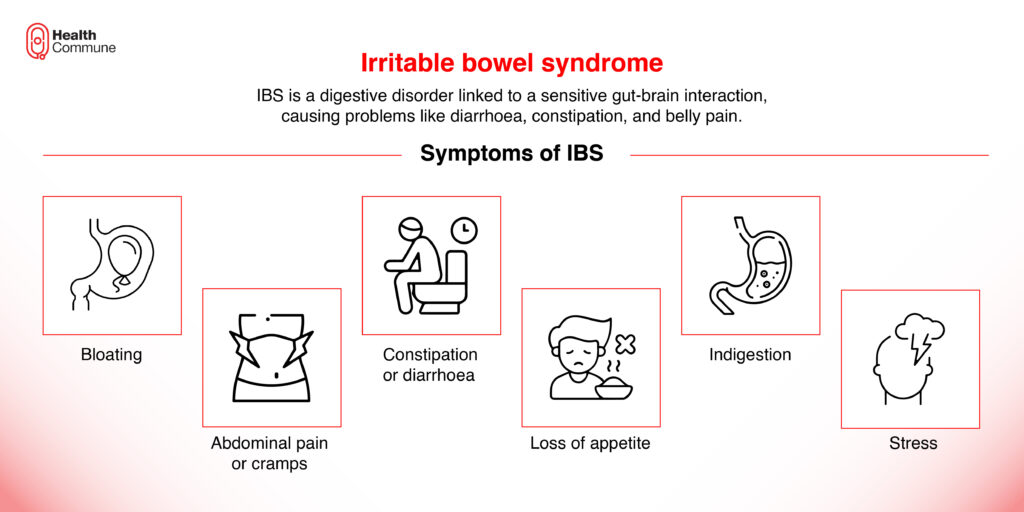Irritable bowel syndrome or IBS is one of the most common diseases that affect the gastrointestinal tract. Here are some facts about irritable bowel syndrome including its causes, risk factors, symptoms, and treatment.
What is irritable bowel syndrome (IBS)?
Irritable bowel syndrome is a condition affecting your digestive system. It is also referred to as a disorder of gut-brain interaction and is linked to issues with how your gut and brain function together. Your digestive tract becomes quite sensitive when this gut-brain interaction is affected, which leads to altered gut muscle contractions. As a result, you may get diarrhoea, constipation, and abdominal pain.
What are the different types of irritable bowel syndrome?
Irritable bowel syndrome is classified based on bowel movements. It includes :
- IBS with constipation (IBS-C): Stools are hard and lumpy
- IBS with diarrhoea (IBS-D): stools are loose and watery
- IBS with mixed bowel habits (IBS-M): when you get loose, watery stools with alternating episodes of hard, lumpy stools

What are the causes of irritable bowel syndrome (IBS)?
There is no exact cause for this disease. Certain factors mainly lead to this condition, which include :
- Infections: Certain infections, like gastroenteritis and bacterial overgrowth (a surplus of bacteria in the intestines), can lead to this condition
- Nervous system: You may experience discomfort, diarrhoea, or constipation if there is insufficient communication between your brain and the nerves in your intestines
- Stress: Stress exposure, especially during childhood, increases the chances of developing this disease
- Changes in your gut microflora: Changes in the bacteria, fungi, and viruses that generally live in the intestines lead to IBS, as they are important for maintaining good health
- Dysmotility: Muscle layers line the inside of the intestines, which contract to move food through your digestive system. Contractions that are stronger and last longer than usual may cause gas, bloating, and diarrhoea. Weak contractions might hinder digestion and cause stiff, dry stools
- Visceral hypersensitivity: Extra sensitive nerves that are present in your digestive tract make you more susceptible to disease.
Who's at a greater risk of developing irritable bowel syndrome?
The chances of getting IBS are higher if you are:
- Below 50 years of age
- Having a positive family history
- Female: Females are more likely to develop IBS, especially when they are on oestrogen therapy before or after menopause
- Exposed to stress, anxiety, and depression
- Having food intolerance (when your body is unable to digest certain foods properly)
What are the primary signs and symptoms of irritable bowel syndrome?
The symptoms of IBS generally include :
- Bloating
- Abdominal pain or cramps
- Bowel movements that are harder (constipation) or looser than (diarrhoea) normal
- Loss of appetite
- Indigestion
How is irritable bowel syndrome diagnosed?
There are no specific diagnostic tests for IBS. A thorough medical history, physical examination, and testing to rule out other diseases, such as celiac disease and inflammatory bowel disease, are likely to be the first steps taken by your healthcare professional. Additional tests are –
Laboratory tests :
- Stool tests: To determine the presence of bacteria, parasites, and bile in your stools
- Breath test: usually done to find out if there is a bacterial overgrowth in your intestines
- Lactose intolerance test: To break down the sugar in dairy products, you require the enzyme lactase. The symptoms of IBS, such as abdominal pain, gas, and diarrhoea, may occur if your body is unable to make lactase. You might be asked to forgo milk and milk-derived items for several weeks, or your doctor might ask you to take a breath test
Imaging procedures :
- Computed tomography (CT scan): This test generates images of your abdomen and pelvis that help your doctor rule out alternative explanations for your symptoms, particularly if you are experiencing abdominal pain
- Colonoscopy: This is used to examine the entire length of your colon
- Upper endoscopy: In this procedure, a long flexible tube with a camera at the end is inserted through your mouth that allows your provider to see your upper digestive tract. A tissue sample (biopsy) may be collected during an endoscopy. A sample of fluid can be collected to look for bacterial overgrowth
What is the course of treatment for IBS (irritable bowel syndrome)?
IBS can be managed by maintaining a healthy lifestyle and diet. There is no specific therapy, but doctors prescribe certain medications according to their causes and symptoms. These include :
- Pain medications: This helps reduce severe pain and bloating (e.g., pregabalin)
- Fibre supplements: These include supplements like psyllium, which help to reduce symptoms of constipation
- Antidiarrhoeal medications: This helps to reduce symptoms of diarrhoea. (eg. loperamide)
- Anticholinergic medications: These are usually given to get relief from painful bowel spasms
- Antidepressants: They include medications like fluoxetine and imipramine, which can help ease abdominal pain as well as improve digestion
- Rifaximin: This is an antibiotic used to treat bacterial overgrowth
- Linaclotide: This drug increases fluid secretion in your intestines and helps you pass stools more easily
- Probiotics: Probiotics are a combination of live bacteria or yeast residing in our bodies that help maintain our gut health
Lifestyle and dietary changes :
- Reduce constipation by increasing fibre in your diet through the consumption of more fruits and vegetables
- Eat at regular times; this will help you regulate bowel function
- Eat smaller meals if you have diarrhoea
- Limit milk and cheese products if you have lactose intolerance
- Exercise regularly
- Try relaxation techniques like meditation and yoga to ease your stress and discomfort
- Keep a record of the foods you take so that you can find out which foods are triggering your IBS. Common triggers include wheat, red wine, onions, etc.
- Try to use a low FODMAP diet. FODMAP stands for fermentable oligosaccharides, disaccharides, monosaccharides, and polyols. These are short chains of carbohydrates (sugars) that are poorly absorbed by the small intestine.
- Foods rich in FODMAP are dairy-based milk, yoghurt, and ice cream; wheat-based cereals, bread, and crackers; vegetables like beans, onions, garlic, and asparagus; and fruits like apples, cherries, pears, and peaches.
- Low-FODMAP foods are eggs, meat, almond milk, oats, vegetables like potatoes, tomatoes, and cucumbers, and some fruits like oranges, strawberries, and pineapple.
- Avoid stress by practising yoga and meditation





